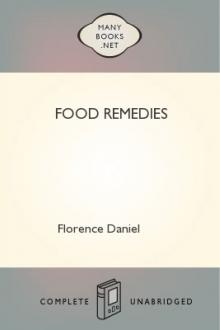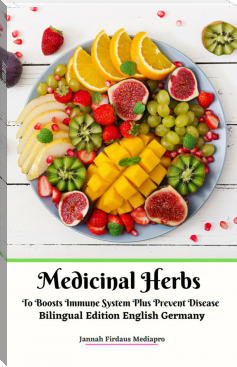Food Remedies - Florence Daniel (parable of the sower read online txt) 📗

- Author: Florence Daniel
- Performer: -
Book online «Food Remedies - Florence Daniel (parable of the sower read online txt) 📗». Author Florence Daniel
In the absence of perfectly ripe bananas, baked bananas may be used. But, although better than no fruit at all, cooked fruit is never so valuable as the fresh fruit, if only the latter be perfectly ripe. Bananas should be baked in their skins, and the stringy pieces carefully removed before eating. From twenty minutes to half an hour's slow cooking is required.
Bananas are excellent food for anæmic persons on account of the iron they contain. A very palatable way of taking them is with fresh orange juice.
A comparatively old-fashioned remedy, for sprained or bruised places that show a tendency to become inflamed is to apply a plaster of banana skin.
Barley.Barley is excellent food for the anæmic and nervous on account of its richness in iron and phosphoric acid. It is also useful in fevers and all inflammatory diseases, on account of its soothing properties. From the earliest times barley water has been the recognised drink of the sick.
Barley Water.When using pearl barley for making barley water it must be well washed. The fine white dust that adheres to it is most unwholesome. For this reason the cook is generally directed to first boil the barley for five minutes, and throw this water away. But in this way some of the valuable properties are thrown away with the dirt. The best results are obtained by well washing it in cold water, but this must be done over and over again. Half-a-dozen waters will not be too many. After the last washing the water should be perfectly clear.
When barley water is being used for curative purposes it should be strong. The following recipe is an excellent one. A ½ pint of barley to 2½ pints water (distilled if possible). Boil for three hours, or until reduced to 2 pints. Strain and add 4 teaspoonfuls fresh lemon juice. Sweeten to taste with pure cane sugar.
Fine Scotch barley is to be preferred to the pearl barley if it can be obtained.
Blackberry.Fresh blackberries are one of the most effectual cures for diarrhœa known. Mr. Broadbent records the case of a child who was cured by eating an abundance of blackberries after five doctors had tried all the known remedies in vain.
Blackberry Tea.In the absence of the fresh fruit a tea made of blackberry jelly and hot water (a large tablespoonful of jelly to half a pint water) will be found very useful. A teacupful should be taken at short intervals.
Blackberry Jelly.To make blackberry jelly get the first fruit of the season if possible, and see that it is ripe or it will yield very little juice. Put it into the preserving pan, crush it, and allow it to simmer slowly until the juice is well drawn out. This will take from three-quarters to one hour. Strain through a jelly bag, or fine clean muslin doubled will do. Then measure the juice, and to every pint allow ¾ lb. best cane sugar. Return to the pan and boil briskly for from twenty minutes to half an hour. Stir with a wooden spoon and keep well skimmed. To test, put a little of the jelly on a cold plate, and if it sets when cold it is done. While still at boiling point pour into clean, dry, and hot jars, and tie down with parchment covers immediately.
Black Currant.Black currant tea is one of the oldest of old-fashioned remedies for sore throats and colds. It is made by pouring half a pint of boiling water on to a large tablespoonful of the jelly or jam. To make the jelly use the same recipe as for blackberry jelly.
The fresh juice pressed from the fruit is, of course, better than tea made from the jelly, but as winter is the season of coughs and colds the fruit is least obtainable when most needed.
Brazil Nut.Brazil nuts are excellent for constipation. They are also a good substitute for suet in puddings. Use 5 oz. nuts to 1 lb. flour. They should be grated in a nut mill or finely chopped.
Beans, Peas, and Lentils.Beans, peas, and lentils are tabooed by the followers of Dr. Haig, the gout specialist, on account of the belief that they tend to increase the secretion of uric acid. But this evil propensity is stoutly denied by other food-reformers. For myself I am inclined to believe that their supposed indigestibility, etc., arises from the fact that they are generally cooked in hard water. They should be cooked in distilled or boiled and filtered rain water. The addition of lemon juice while cooking renders them much more digestible.
According to Sir Henry Thomson haricot beans are more easily digested than meat by most stomachs. "Consuming weight for weight, the eater feels lighter and less oppressed, as a rule, after the leguminous dish; while the comparative cost is greatly in favour of the latter."
Lentils are the most easily digested of all the pulse foods, and therefore the most suitable for weakly persons. A soup made of distilled water and red lentils may be taken twice a week with advantage. Lentils contain a good percentage of iron, and also phosphates.
Beet.The red beet is useful in some diseases of the womb, while the white beet is good for the liver. It is laxative and diuretic. The juice mixed with olive oil is also recommended to be applied externally for burns and all kinds of running sores.
Cabbage.All the varieties of the colewort tribe, including cabbage, cauliflower, brussels-sprouts, broccoli, and curly greens, have been celebrated from very ancient times for their curative virtues in pulmonary complaints. And Athenian doctors prescribed cabbage for nursing mothers. On account of the sulphur contained in them cabbages are good for rheumatic patients. They may be eaten steamed, or, better still, boiled in soft water and the broth only taken. The ordinary boiled cabbage is an indigestible "windy" vegetable, and should never be eaten.
Caraway Seed.Caraway seeds sharpen the vision, promote the secretion of milk, and are good against hysterical affections. They are also useful in cases of colic. When used to flavour cakes the seeds should be pounded in a mortar, especially if children are to partake thereof.
When used medicinally 20 grains of the powdered seeds may be taken in a wineglassful of hot water. But for children half an ounce of the bruised seeds are to be infused in cold water for six hours, and from 1 to 3 teaspoonfuls of this water given.
A poultice of crushed caraway seeds moistened with hot water is good for sprains.
Caraway seeds are narcotic, and should therefore be used with caution.
Carrot.Carrots are strongly antiseptic. They are said to be mentally invigorating and nerve restoring. They have the reputation of being very indigestible on account of the fact that they are generally boiled, not steamed. When used medicinally it is best to take the fresh, raw juice. This is easily obtained by grating the carrot finely on a common penny bread grater, and straining and pressing the pulp thus obtained.
Raw carrot juice, or a raw carrot eaten fasting, will expel worms. The cooked carrot is useless for this purpose.
A poultice of fresh carrot pulp will heal ulcers.
Fresh carrot juice is also good for consumptives on account of the large amount of sugar it contains.
Carrots are very good for gouty subjects and for derangements of the liver.
Celery.Celery is almost a specific for rheumatism, gout, and nervous indigestion. The most useful plants for this purpose are small, not too rapidly grown nor very highly manured.
It may be eaten raw, or steamed, or in soup. Strong celery broth flavoured with parsley is excellent.
Cresses.All the cresses are anti-scorbutic, that is, useful against the scurvy. The ancient Greeks also believed them to be good for the brain.
The ordinary "mustard and cress" of our salads is good for rheumatic patients, while the water-cress is valuable in cases of tubercular disease. Anæmic patients may also eat freely of it on account of the iron it contains. Care should be taken, however, from whence it is procured, as a disease peculiar to sheep but communicable to man may be carried by it. It should not be gathered from streams running through meadows inhabited by sheep.
Chestnut.Chestnuts, when cooked, are valuable food for persons with weak digestive powers. They should be put on the fire in a saucepan of cold water and cooked for twenty minutes from the time the water first boils. John Evelyn, F.R.S., a seventeenth century writer, says of them: "They are a lusty and masculine food for rustics at all times, and of better nourishment for husbandmen than cole and rusty bacon, yea, or beans to boot."
Cinnamon.Cinnamon is a very old-fashioned remedy for soothing the pain of internal or unbroken cancer. One prescription is the following: Take 1 lb. of Ceylon sticks. Simmer in a closed vessel with 1 quart of water until the liquid is reduced to 1 pint. Pour off without straining, and shake or stir well before taking. Take half a pint every twenty-four hours. Divide into small doses and take regularly.
Cinnamon has a powerful influence over disease germs, but care must be taken to obtain it pure. It is often adulterated with cassia.
Cinnamon tea may be taken with advantage in cases of consumption, influenza, and pneumonia.
Cocoanut.Cocoanut is an old and very efficacious remedy for intestinal worms of all kinds. A tablespoonful of freshly-ground cocoanut should be taken at breakfast until the cure is complete. The dessicated cocoanut is useless for curative purposes.
Coffee.Coffee is a most powerful antiseptic, and therefore very useful as a disinfectant. It has been used as a specific against cholera with marvellous results, and is useful in all cases of intestinal derangement. But only the pale-roasted varieties should be taken, as the roasting develops the poisonous, irritating properties. There is always danger in the roasting of grains or berries on account of the new substances that may be developed.
I do not recommend coffee as a beverage, but as a medicine.
Date.The nourishing properties of dates are well known. They are easily digested, and for this reason are often recommended to consumptive patients.
According to Dr. Fernie half a pound of dates and half a pint of new milk will make a satisfying repast for a person engaged in sedentary work.
Elderberry.The elderberry has fallen into neglect of late years, owing to the lazy and disastrous modern habit of substituting the mineral drugs of the chemist for the home-made vegetable remedies of our grandmothers. Nevertheless, the elderberry is one of the most ancient and tried of medicines, held in such great esteem in Germany that, according to the German folk-lore, men should take off their hats in the presence of an elder-tree. In Denmark there is a legend to the effect that the trees are under the protection of a being known as the Elder-Mother, who has been immortalised in one of the fairy tales of Hans





Comments (0)